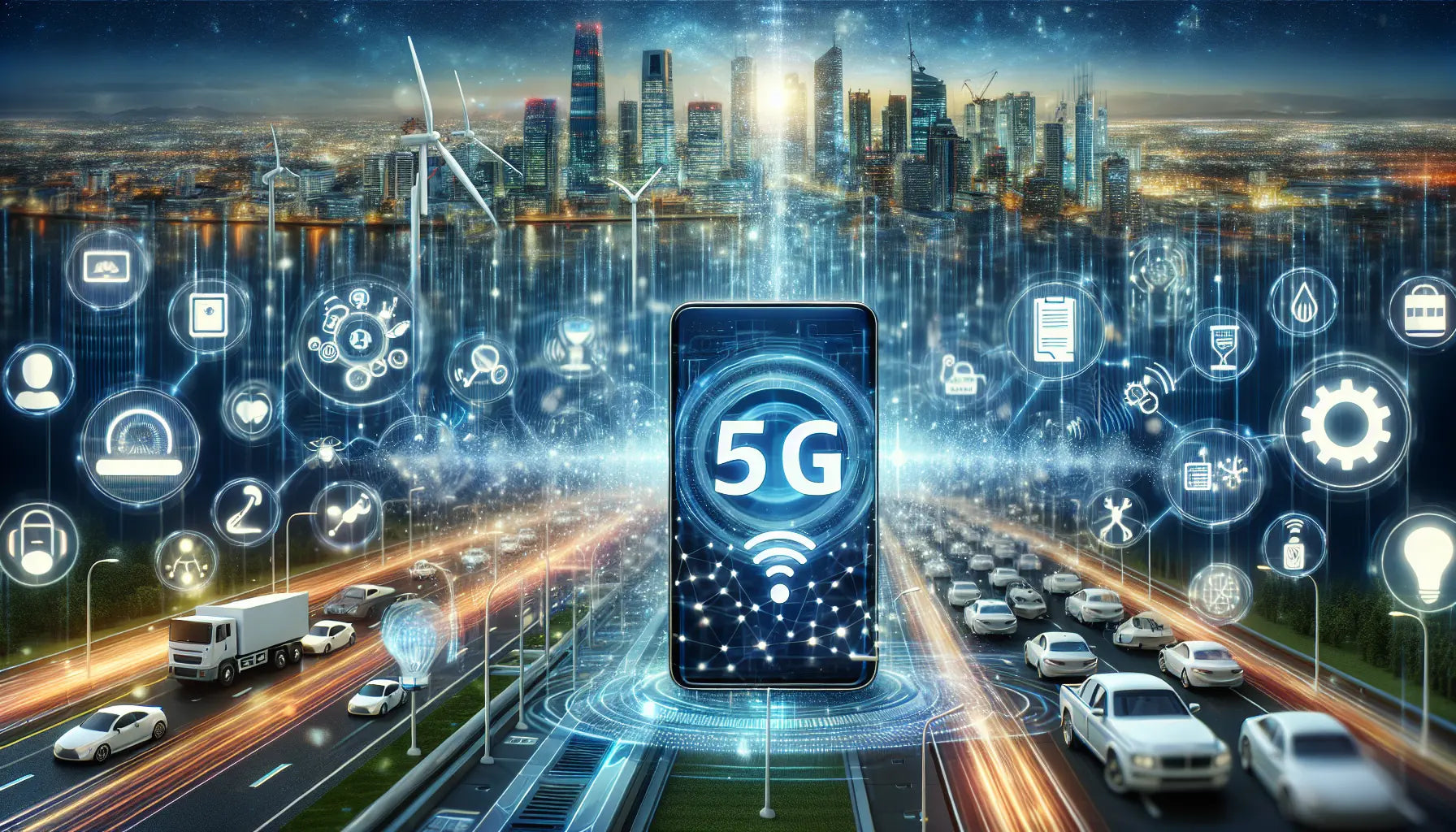5G Technology: How It's Revolutionizing the Mobile Phone Industry

Introduction
Looking back at the journey of mobile phones, it's truly remarkable to see how technology has advanced over the years. From the simple analog phones to the era of the internet, each phase has brought significant changes to our daily lives. Now, with the anticipation surrounding 5G technology, we're on the brink of welcoming high-speed internet like never before.
Previous generations of technology have already left a profound impact. 1G enabled us to make calls from anywhere, while 2G introduced messaging and voice recording. Then came 3G, which brought smartphones and broadband services into the mainstream, followed by 4G, which revolutionized internet speed and social media connectivity.
However, the upcoming 5G technology promises to take the mobile phone industry to new heights. Its potential benefits are immense – offering lightning-fast internet speeds, enhancing gaming experiences, fostering smart city development, and facilitating seamless communication between connected devices. With 5G, our lives are poised to become even more interconnected and convenient.
How 5G Technology Works
1. Understanding the basics of 5G technology:
5G technology marks the next phase in mobile network evolution. It boasts lightning-fast internet speeds and significantly enhances communication between various connected devices. Operating on higher frequency bands enables faster data transfer rates and reduces latency.
2. The role of machine-to-machine communication:
One of the most exciting aspects of 5G is its ability to facilitate machine-to-machine communication. This means that connected devices can interact with each other autonomously, paving the way for automation and increased efficiency across multiple industries.
3. The use of chatbots and artificial intelligence:
As 5G technology becomes more widespread, we can expect to see a significant rise in how much we rely on chatbots and artificial intelligence. These tools are poised to transform the way we interact with technology and each other.
One major benefit of this shift will be the speed at which we can get assistance. With chatbots powered by 5G, we'll be able to receive instant responses to our questions and concerns, leading to quicker problem-solving and customer support.
But it's not just about speed – AI algorithms will also play a crucial role in enhancing our overall experience. By handling complex tasks behind the scenes, these algorithms will allow businesses to deliver more personalized services and recommendations. This means we'll feel more understood and catered to, whether we're shopping online or seeking information.
In short, the combination of 5G and AI is set to revolutionize the way we interact with technology, offering faster, smarter, and more personalized experiences across the board.
4. Implementation of 5G technology in various settings:
The integration of 5G technology into various environments is poised to revolutionize how we interact with our surroundings. From smart cities to transportation systems and even medical devices, the impact of 5G will be far-reaching.
In smart cities, 5G's ability to collect and analyze data in real-time will enable more efficient resource management, better traffic flow, and enhanced public safety measures. This means smoother commutes, optimized energy usage, and quicker emergency responses.
Similarly, in transportation networks, 5G will facilitate the seamless exchange of information between vehicles, infrastructure, and traffic management systems. This connectivity will pave the way for autonomous vehicles, reducing accidents and congestion while improving overall efficiency.
Even in the realm of healthcare, 5G's high-speed data transmission and low latency will enable remote patient monitoring, telemedicine consultations, and real-time data analysis for medical devices. This can lead to more personalized and accessible healthcare services, particularly in remote or underserved areas.
Overall, the implementation of 5G technology promises to enhance services, streamline processes, and ultimately improve the quality of life for people around the world.
5. Improvements in speed and stability:
5G technology brings some really impressive advancements in speed and stability that are hard to ignore. The faster internet speeds mean we can now download and stream content seamlessly, without any annoying buffering. Plus, the promise of improved stability means we won't have to deal with those frustrating moments of sudden disconnection anymore. It's like finally having a smooth, uninterrupted ride on the information superhighway!
5G Technology and Its Potential Impact
The upcoming wave of 5G technology isn't just about faster smartphones; it's set to shake up multiple facets of our daily routines. Here's a glimpse at the potential changes we might see:
1. Revolutionizing Transportation:
Imagine smoother traffic flows and fewer accidents. With 5G, that vision could become reality. Connected vehicles and self-driving cars will communicate instantly, making our roads safer and transportation systems more efficient.
2. Elevating Gaming:
Gamers, get ready for a whole new level of immersion. Thanks to ultra-low latency and lightning-fast data transfers, online gaming will be seamless. Plus, brace yourself for mind-blowing virtual reality and augmented reality experiences.
3. Smart Homes, Smarter Living:
5G isn't just about phones; it's about making homes smarter too. Picture this: your air conditioner, fridge, and lights all responding to your voice commands effortlessly. That's the kind of convenience and comfort 5G can bring to smart housing solutions.
4. Data Deluge, Handled with Ease:
One of the most exciting aspects of 5G is its ability to handle colossal amounts of data with ease. Businesses will be able to collect and analyze real-time data more effectively, leading to smarter decision-making and better services for us all.
5. Potential risks and concerns:
While 5G technology offers numerous benefits, it also raises some concerns. These include potential security risks associated with the increased number of connected devices. Additionally, there have been unsubstantiated claims linking 5G technology to health issues, although scientific studies have found no evidence to support these claims.
Global Progress and Challenges
As we witness the ongoing evolution of 5G technology, nations worldwide are making significant strides forward, albeit not without encountering some hurdles along the way. Among these, China stands out as a frontrunner in the 5G race, with companies such as Huawei spearheading advancements in this domain. China's substantial investments and dedication to research have firmly established it as a leader in the 5G revolution.
Nevertheless, amidst this progress, concerns have arisen regarding data security and privacy. The proliferation of interconnected devices and the consequent accumulation of vast amounts of data underscore the pressing need to address these issues. Collaboration between governments and technology firms is essential to ensure robust encryption and protection against potential cyber threats.
Effective preparation and collaboration are crucial for the successful implementation of 5G technology. Telecom companies and other stakeholders must join forces to build a resilient network infrastructure capable of supporting the demands of 5G technology. This involves the widespread deployment of antennas and fiber cables to facilitate high-speed data transfer.
One of the primary challenges in rolling out 5G technology lies in establishing a dependable network infrastructure. The shorter range of 5G signals necessitates a denser network of antennas compared to previous generations. Companies like Sterlite Technologies are pioneering innovations to develop more efficient network systems, ensuring uninterrupted connectivity.
Furthermore, there's a growing concern about the potential implications of 5G technology for cyber warfare. With its enhanced speed and capabilities, 5G networks could become a tool in the arsenal of nations engaged in cyber conflicts. Consequently, governments must prioritize the development of robust cybersecurity measures to mitigate potential threats.
Despite these challenges, the potential benefits of 5G technology are immense. It holds the promise of transforming industries and revolutionizing everyday life. From the realization of smart cities and transportation systems to delivering enhanced gaming experiences and improving healthcare services, 5G technology offers a plethora of opportunities for innovation and advancement.
Conclusion
As 5G technology continues to advance, it holds immense promise for revolutionizing the mobile phone industry and various facets of daily life. With lightning-fast internet speeds, enhanced communication between devices, and the realization of smart city initiatives, 5G stands to bring about significant transformations.
However, it's essential to strike a balance between the benefits of 5G technology and the potential risks and concerns. Prioritizing security measures such as encryption is crucial to safeguard against cyber threats and protect user privacy. Ongoing research and development efforts are necessary to address these concerns and enhance the overall security of 5G networks.
Furthermore, the global implications of 5G technology cannot be understated. Different countries are making strides in implementing 5G, with China leading the charge. This underscores the importance of addressing data security concerns and fostering international collaborations to establish standards and protocols.
In conclusion, 5G technology holds the potential to transform industries, improve communication, and enhance everyday life. However, it's imperative to approach its implementation with caution, prioritize security measures, and continue research and development efforts to ensure its safe and widespread adoption.
FAQ
1, What is 5G technology?
5G technology represents the next generation of mobile network technology, offering lightning-fast internet speeds and improved communication between connected devices.
2. How does 5G technology work?
5G technology operates on higher frequency bands, enabling faster data transfer rates and reduced latency. It facilitates machine-to-machine communication and leverages chatbots and artificial intelligence.
3. What are the potential benefits of 5G technology?
Potential benefits of 5G technology include lightning-fast internet speeds, enhanced gaming experiences, advancements in smart housing solutions, and improved data handling capabilities.
4. What are the potential risks and concerns associated with 5G technology?
While 5G technology offers numerous benefits, concerns include potential security risks associated with increased connected devices and unfounded claims linking 5G technology to health issues.
5. What is the global progress and challenges for implementing 5G?
Countries worldwide are making progress in implementing 5G technology, with China leading the way. However, challenges such as data security, network infrastructure, and cyber warfare must be addressed for effective implementation.





